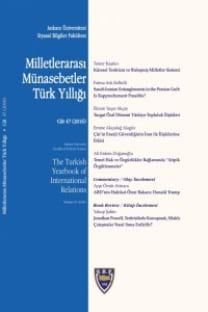Temel Hak ve Özgürlükler Bağlamında Atipik Örgütlenmeler
Sivil örgütlenmeler alanında anayasa veya kanun hükümlerinde haklarında doğrudan düzenlemeler bulunan sendika, siyasi parti ve dernek gibi tipik öğütlenme biçimlerine karşılık gelmeyen, platform, inisiyatif, hareket, kongre, kurul, dayanışma, birlik gibi adlarla anılan atipik örgütlenmelerle karşılaşılmaktadır. Özellikle tipik örgütlenmelere ilişkin kuruluş işlemlerinin zorluğu ve iletişim olanaklarının genişleyip çeşitlenmesinin getirdiği kolaylıklar atipik örgütlenmeyi giderek yaygınlaştırmaktadır. Atipik örgütlenmelerin ortaya çıkması ve yaygınlaşması bu türden örgütlenmelerin hukuken nitelendirilmesi ve dolayısıyla hukuk alanında bu konuda çalışılması ihtiyacını ortaya çıkarmaktadır. Bu makalede “atipik örgütlenme” kavramından ne anlaşıldığının “tipik - atipik” ayrımı çerçevesinde ortaya konması ve atipik örgütlenmelerin anayasa hukuku ve temel hak ve özgürlükler alanında hukuki statülerinin belirlenmesine katkıda bulunmak amaçlanmaktadır. Atipik örgütlenmelerinin hukuki statülerinin belirlenmesi konusunda makalede üzerinde durulan temel soru atipik biçimlerle örgütlenmenin anayasal koruma altında sayılıp sayılmayacağıdır. Temel tartışma bu soru üzerinden yürütülmektedir
Anahtar Kelimeler:
Temel hak ve özgürlükler, dernek özgürlüğü, örgütlenme özgürlüğü, iletişim özgürlüğü, atipik örgütlenmeler
“Atypical Organizations” in the Context of Fundamental Rights and Freedoms
In the field of civil organizations, there are atypical organizations such as platform, initiative, movement, congress, board, solidarity and unity that do not correspond to the typical forms of remuneration such as trade unions, political parties and associations which are directly regulated by the constitution or the provisions of laws. Especially the difficulties of establishing processes related to typical organizations and the advantages of expanding and diversifying communication facilities are increasing both the number and the variety of the atypical organizations. The emergence and dissemination of atypical organizations reveals the need for legal characterisation of such organizations and therefore the need to work on this issue in the field of law. In this article, it is aimed to show what is understood from the concept of "atypical organization" within the context of "typical - atypical" distinction and to contribute to the determination of legal status of atypical organizations in the field of constitutional law and fundamental rights and freedoms. The main question on the issue of determining the legal status of atypical organizations is whether atypical forms of organizing will be considered to have constitutional protection. The main argumentation is based on this question
Keywords:
Fundamental rights and freedoms, freedom of association, freedom of communication, atypical organizations,
- ISSN: 0544-1943
- Yayın Aralığı: 1
- Başlangıç: 1960
- Yayıncı: Ankara Üniversitesi Siyasal Bilgiler Fakültesi Uluslararası İlişkiler Bölümü
Sayıdaki Diğer Makaleler
Temel Hak ve Özgürlükler Bağlamında Atipik Örgütlenmeler
Çin'in Enerji Güvenliğinin İran ile İlişkilerine Etkisi
Turgut Özal Dönemi Türkiye-Topluluk İlişkileri
Saudi-Iranian Entanglements in the Persian Gulf: Is Rapprochement Possible?
